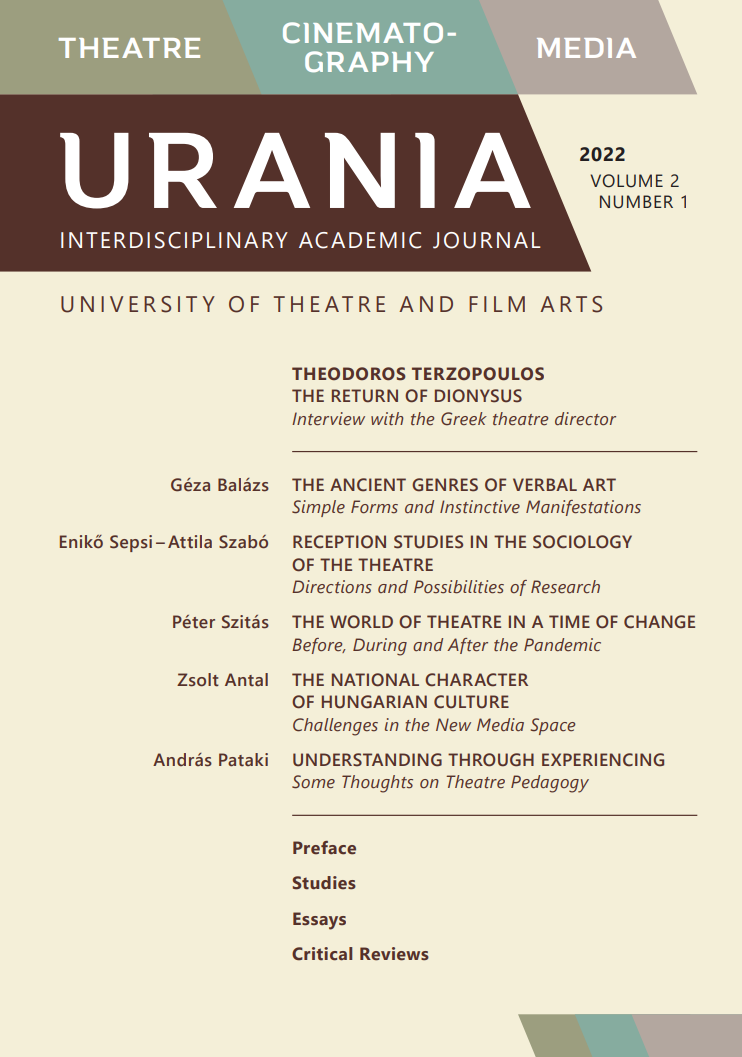Reception Studies in the Sociology of the Theatre
Directions and Possibilities of Research
Abstract
The study briefly summarises the position of sociological research on theatre reception in Hungary and its findings to date, outlining the main research activities of the new Research Group on Theatre Education and the Sociology of the Theatre at the Károli Gáspár Reformed University. In the second section, we will present the report of an international questionnaire-based survey conducted on a large sample, which can serve as a methodological and theoretical basis for subsequent research. In 2005, the STEP (Project on European Theatre Systems) international Sociology of the Theatre research group, a collaborative partnership between several European universities, recorded detailed performance evaluations of theatregoers in four European cities between 2010 and 2013, with the aim of mapping differences in audience experience and attitudes in countries with very different theatre systems (the Netherlands, the UK, Estonia, and Hungary). The survey included 156 performances, and a total of 7,121 respondents participated in it. In addition to presenting the research methodology and the general results, this paper will focus on the evaluation of the relevance (both personal and social) of the performances.
References
Demcsák Katalin, Imre Zoltán and P. Müller Péter. 2005. Színház és szociológia határán. Budapest: Kijárat Kiadó.
Domokos Johanna and Sepsi Enikő, ed. 2021. Poetic Rituality in Theater and Literature. Budapest: KRE–L’Harmattan Könyvkiadó – Károli Könyvek.
Edelman, Joshua, Louise Ejgod Hansen, Quirijn Lennert van den Hoogen. 2016. The Problem of Theatrical Autonomy: Analysing Theatre as a Social Practice. Amsterdam: Amsterdam University Press. https://doi.org/10.1515/9789048530274
Edelman, Joshua and Šorli, Maja. 2015. “Measuring the value of theatre for Tyneside audiences.” In Cultural Trends 24:3, 232–244. https://doi.org/10.1080/09548963.2015.1066074
Edelman, Joshua, Maja Šorli and Mark Robinson. 2014. The Value of Theatre and Dance for Tyneside’s Audiences. Arts and Humanities Research Council – Cultural Value Project. Viewed on 1 May 2022. https://www.thinkingpractice.co.uk/wp-content/uploads/2014/08/Value-for-Tyneside-Audiences.pdf
Šorli, Maja, ed. 2015. Amfiteater 3 (1-2), AGFRT Ljubljana, 235–273. Viewed on 03.06.2022. https://issuu.com/ul_agrft/docs/amfiteater__web_3pika1-2
van den Hoogen, Quirijn Lennert and Anneli Saro. 2015. “How theatre systems shape outcomes.” Amfiteater 3 (1-2), AGFRT Ljubljana, 357–363.
van Maanen, Hans. 2009. How to Study Art Words On the Societal Functioning of Aesthetic Values, 150–202. Amsterdam: Amsterdam University Press. https://doi.org/10.5117/9789089641526
van Maanen, Hans, Andreas Kotte and Anneli Saro, ed. 2009. Global Changes – Local Stages. How Theatre Functions in Smaller European Countries. Amsterdam: Rodopi. https://doi.org/10.1163/9789042026131
Pavis, Patrice. 2003. Előadáselemzés, Translated by Jákfalvi Magdolna. Budapest: Balassi Kiadó.
Sepsi Enikő, Kasek Roland and Lázár Imre. 2022. Művészeti befogadás pszichofiziológiai vizsgálata Noldus Facereader segítségével. In: Érzelmek élettana járvány idején, ed. Lázár Imre, 212–227. Budapest: KRE–L’Harmattan Könyvkiadó – Károli Könyvek.
Sepsi Enikő. 2019. A művészetbefogadás pszichofiziológiai vizsgálatának lehetőségei (irodalom, színház, film). In A társas-lelki és művészeti folyamatok pszichofiziológiája, ed. Lázár Imre, 293–299. Budapest: KRE–L’Harmattan Könyvkiadó – Károli Könyvek.
Szabó Attila. 2019. A kortárs színház társadalmi és személyes relevanciája egy nemzetközi színház-szociológiai kutatás eredményei alapján. In: Színház és néző, ed. Burkus Boglárka and Tinkó Máté, 152–176. Budapest: Doktoranduszok Országos Szövetsége, Irodalomtudományi Osztály.
Vásárhelyi Mária. 2005. „A színház egy zárt világ?” In Színházi jelenlét – színházi jövőkép, ed. Szabó István, 139–151. NKA Kutatások 1. Budapest: Országos Színháztörténeti Múzeum és Intézet.




